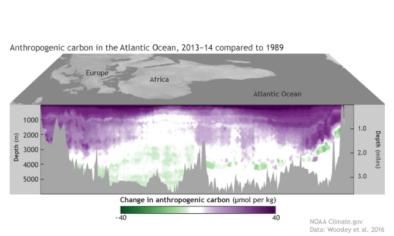Science Source
Is Ocean Acidification an Open-Ocean Syndrome? Understanding Anthropogenic Impacts on Seawater pH
- States that changes in pH in coastal ecosystems result from a multitude of drivers, including impacts from watershed processes, nutrient inputs, and changes in ecosystem structure and metabolism. Interaction between ocean acidification due to anthropogenic CO2 emissions and the dynamic regional to local drivers of coastal ecosystems have resulted in complex regulation of pH in coastal waters
- States that the intense variability and multiple, complex controls on pH implies that the concept of ocean acidification due to anthropogenic CO2 emissions cannot be transposed to coastal ecosystems directly; furthermore, in coastal ecosystems, the detection of trends towards acidification is not trivial and the attribution of these changes to anthropogenic CO2emissions is even more problematic
- States that coastal ecosystems may show acidification or basification, depending on the balance between the invasion of coastal waters by anthropogenic CO2, watershed export of alkalinity, organic matter and CO2, and changes in the balance between primary production, respiration and calcification rates in response to changes in nutrient inputs and losses of ecosystem components
- Contends that ocean acidification from anthropogenic CO2 is largely an open-ocean syndrome and that a concept of anthropogenic impacts on marine pH, which is applicable across the entire ocean, from coastal to open-ocean environments, provides a superior framework to consider the multiple components of the anthropogenic perturbation of marine pH trajectories
- Concludes that the concept of anthropogenic impacts on seawater pH acknowledges that a regional focus is necessary to predict future trajectories in the pH of coastal waters and points at opportunities to manage these trajectories locally to conserve coastal organisms vulnerable to ocean acidification
Related Content
Headline

Jun 6, 2018 | NOAA Climate.gov
Cruises cut a slice through the Atlantic's carbon pie
Science Source
| Nature Climate Change
Detecting regional anthropogenic trends in ocean acidification against natural variability
T. Friedrich, A. Timmermann, A. Abe-Ouchi et al
Science Source
| Biogeosciences
Using present-day observations to detect when anthropogenic change forces surface ocean carbonate chemistry outside preindustrial bounds
Sutton, Adrienne J., Sabine et al
Science Source
| Proceedings of the National Academy of Sciences
Ocean acidification affects coral growth by reducing skeletal density
Nathaniel R. Mollica, Weifu Guo, Anne L. Cohen et al


